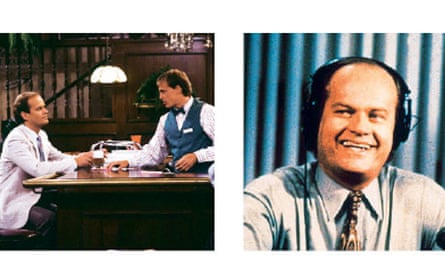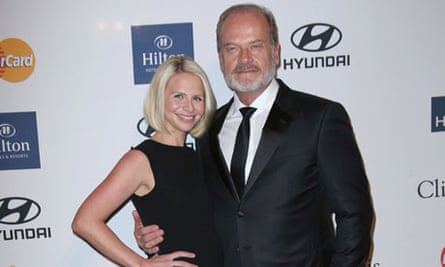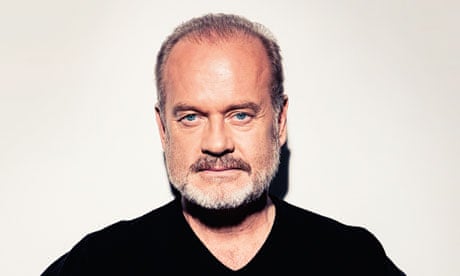In his compelling new television drama, Boss, Kelsey Grammer plays the (fictional) mayor of Chicago, Tom Kane, as a cross between Richard III and Richard Nixon: a ruthless, rage-filled gangster so hollowed out by the getting and keeping of power that there's no one he won't betray. In one memorable early scene, alone in his kitchen at night, Kane opens a gift-wrapped package to discover the bloody, severed ears of a businessman who's been obstructing his plans. He drops them into the garbage-disposal unit, then nonchalantly goes to tell his wife (estranged, of course, though they live in the same house) that they'll need to call a plumber. But watching all this, it's hard to avoid the thought that Mayor Kane's true target – the man he'd really like to finish off with a swift bullet to the head in some dark Chicago alley – is Dr Frasier Crane. Counting his appearances in both Cheers and Frasier, Grammer played the pompous yet essentially lovable psychiatrist for two decades, from 1984 to 2004, the longest-running job in sitcom history, and none of his roles since has come close to dislodging the public perception that Grammer is Crane.
The new show, as Grammer explains when we meet at a Beverly Hills hotel, was the result of a conscious decision to make as radical a departure as possible: "It's good to say, 'By the way, in case you hadn't figured it out, I can also do this.'" He is a towering, loping presence; at 58, he seems finally to have attained the middle age that he exuded, as Frasier Crane, from his early 30s onwards.
The only storyline that has repeatedly threatened to overshadow Grammer's best-known screen role is that of his personal life: from his vigorous pursuit, in the 1980s and 1990s, of as much alcohol as he could feasibly consume, and many drugs besides, leading to a month's jail time for drink-driving and a conviction for cocaine possession; to his vocal support for the Republican party; to a ferocious multimillion-dollar divorce and child custody battle with his third wife, Camille Grammer, the former Playboy model and current star of The Real Housewives Of Beverly Hills whose name he refuses even to speak; to his 2011 marriage to Kayte Walsh, a British woman 26 years his junior, whom he met on a Virgin Atlantic flight from LA to London on which she was working as a flight attendant.
A few days before our interview, a publicist tries to persuade me not to ask Grammer any questions about his personal life. Last autumn, he stalked off the set of Piers Morgan's CNN show moments before a live interview, apparently because Morgan planned to display a photograph of Camille on screen. But the request is pointless: Grammer talks about his personal life with no prompting, almost compulsively. He talks, especially, about his refusal to talk about Camille. "There are… forces at work in my life these days that blast stuff out all over the internet," he says at one point, in response to a frankly gentle question that didn't touch on his ex-wife at all. "And there's only one source for these stories." He frowns. "And I'm not going to name her."
In the opening scene of Boss, Tom Kane receives a diagnosis of Lewy body dementia, a lesser-known degenerative disease characterised by vivid hallucinations, shaking and cognitive decline that will kill the mayor within a few years. This built-in timebomb is one of several ways in which the show echoes Breaking Bad, which derives its early urgency from its lead character's cancer diagnosis; meanwhile, everything from the opening credits to the panoramic shots of Chicago invite comparison with The Wire.
If Boss, which started on More4 this week, doesn't quite reach the standard of either, it's because of its anxious insistence on hooking the viewer with ever more sensational plot developments, along with sex scenes so gratuitous it's impossible not to laugh. Kane's machinations, assisted by his inscrutable aide Kitty O'Neill, played by Kathleen Robertson, are regularly interrupted so that Robertson's character can remove most of her clothes in order to have sex with one of the mayor's proteges (Ben Zajac, played by Jeff Hephner).
But all this lurid stuff, Grammer insists, is the point: "We wanted Jacobean-slash-Shakespearean, privy councillors, hidden lives, bastard children." The current mayor of Chicago, Rahm Emanuel, has seen Boss, Grammer reports, as has Richard M Daley, the ex-mayor whose father and mayor before him, the legendary Richard J Daley, is the closest thing to a real-life model for Kane. "They like the character, because they want people to think the mayor is that guy. A monster – but you love the monster. He's done bad, bad things, and perhaps he has abdicated his humanity to his work. But the remnant of humanity is in there somewhere." Emanuel once sent a dead fish in a box to a pollster with whom he was having a disagreement – not quite a severed human ear, but you can see why he might feel a certain affinity.

By his own admission, Grammer isn't an actor with a capital A, diligently developing his character off-camera or deeply researching his roles. "I'm a walk-on guy," he says with some pride. "When the director says, 'Action', I'm on." During the worst years of his alcoholism, he could reportedly turn up wrecked to a recording of Frasier, then snap into character, alongside his co-stars David Hyde Pierce, Jane Leeves and John Mahoney, and play Crane with absolute conviction. (On the other hand, the cast members of both Cheers and Frasier felt moved to stage interventions, which failed.) The rest of the time he was busy, as he puts it, being "America's favourite tabloid presence", an off-the-rails celebrity bafflingly unlike the prissy Dr Crane. "I had a kind of romantic notion about being a Hollywood Errol Flynn type," he recalls. "Honestly, I did not get into a lot of bar brawls – but I was always willing to. About the only thing missing from my story is that I haven't had a full knock-down fight in the middle of the Polo Lounge."
You don't need to be a psychiatrist – or to have played one on TV – to discern the roots of this behaviour. Grammer's childhood and early adulthood were marked by an extraordinary sequence of tragic events. First, his father, who had abandoned the family when Grammer was three, was murdered; later, two half-brothers would be killed in a diving accident. But what he calls "the crystallising tragic event of my life" took place in 1975, when his younger sister, Karen, was abducted, raped and murdered, one of three victims of a Colorado spree killer. A 20-year-old Kelsey had to identify her body. "I could not work through it for 20 years," he says. "And then… I did. Just through self-forgiveness. It's a weird thing. I finally worked out that I didn't need to carry it any more, this idea that I was responsible in some way. It's always there. It's always bubbling beneath the surface. Something will happen – a certain look on somebody's face, even a commercial on television, or a news report about this poor girl [the victim in the Steubenville rape case], and that'll tweak something. It never goes away." In recent years, he has actively fought against the possibility of his sister's killer being paroled.
There followed, after Grammer's emergence from alcohol-fuelled self-destruction, years of lucrative professional success, along with a few professional blips – a stage production of Macbeth was badly received and closed early – but they were also years of worsening marital discord. Then, in 2008, while on holiday in Hawaii with Camille, Grammer suffered a heart attack, which in his telling triggered a re-evaluation of his life. "I don't really want to go into it, because whenever I say anything about my past now, it becomes a pissing match… but I realised that I had acquiesced, in my 40s, to an idea of 'You know what, maybe this thing that you wanted in your life, maybe it just wasn't important'… And then I had my heart attack, and I thought, 'I don't want this to be the final story in my life.'"

Shortly thereafter, Grammer was offered the role of Georges in a Broadway revival of the musical La Cage Aux Folles, and it was on a Christmas trip to see the London production that he first encountered Walsh, daughter of the former Bristol City striker Alan Walsh. Later the same week, they met up in central London. Grammer tells the story in a tone that suggests he realises it would probably be rejected as a scene in a romantic comedy on the grounds of being too cheesy. "She came out of the tube stop across from Harvey Nichols, and I walked across the street from the hotel, and there she stood, and I just thought, 'That's the most beautiful thing I've ever seen.' And then we went for a walk in Hyde Park, and the moment we stepped into Hyde Park, snow began to fall." They rode a Christmas ferris wheel, and when they reached the top, "I looked at her, I kissed her, and we've been together ever since. I was finally ready. I was reborn."
The couple have a daughter, Faith, now eight months old – a half-sister to Grammer's four other children (one with his first wife, two with his third and one with a make-up artist).
For all the Love Actually schmaltz, by the end of this story Grammer is in a state of such rapt delight that a listener can't avoid being affected. Yet it also serves as a kind of rhetorical bulldozer, obliterating prying questions about the relationship, such as the enormous age difference, or the fact that it began as an extramarital affair when Grammer was still married to Camille. It's "the first time" he's felt optimistic about the possibility of "carving out a life together with someone", he says. Peruse earlier interviews and you'll find him saying similar things about Camille, but he brushes that fact aside with an ease that's vaguely unsettling: "I've said nice things about the people I was with before, but that's what you do. This is truly different. It was just magic."
Grammer is as famous in Hollywood these days for his politics as for his earlier misdemeanours. What makes him a Republican in an industry dominated by Democrats? "The idea of self-reliance is important to me, and that is echoed, in my way of thinking, by a conservative approach to politics," he says. "But that is not what most people believe right now. The majority of people want bigger government. They want government to take care of them." The foundation of this position, perhaps unsurprisingly, turns out to be tax: Grammer finds it "pretty hard to swallow" that he should have to pay "more than half my income" in tax.
Does he really think, as he claimed recently in an interview with Jay Leno, that he was denied an Emmy award for Boss because of his politics? "Is it possible that they might think, 'Oh gosh, I don't like what he stands for'? Sure it is." And would he really, as he has suggested several times in the past, consider running for office as a Republican? "That still may happen," he says. "It would be a big nut to swallow." What would voters make of the alcohol, the drugs, the multiple wives or, for that matter, the sex tape (yes, there was one, in 1998)?
"Oh, all that would come up," Grammer says. "But I don't think it needs to stick. George Bush went through something similar and he said, 'Look, there's some stuff in my past.' And then you move on." There is "a certain elegance" in public service, he says, sounding suddenly like Frasier Crane to the point where I wonder if the whole thing's a joke. I rather hope so.

Comments (…)
Sign in or create your Guardian account to join the discussion